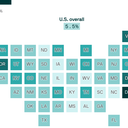U.S. states where the highest and lowest shares of LGBT adults live

Washington, D.C., Oregon and Delaware have comparatively large estimated shares of adult residents who identify as LGBT, per a recent analysis.
Why it matters: It's difficult to pin down the exact size of the LGBT population nationwide or in any given state, in part because gold-standard data collection efforts like the decennial census or the American Community Survey lack specific relevant questions.
- Yet having some sense of the LGBT community's size is vital for meeting its public health and other policy needs.
Details: The estimates come by way of the Williams Institute, a UCLA Law think tank focused on sexual orientation and gender identity law and public policy.
- They're based on combined 2020-2021 data from the Behavioral Risk Factor Surveillance System, a CDC effort to collect wide-ranging health info through phone surveys.
What they found: Washington, D.C., has the highest estimated share of adults identifying as LGBT among it and the 50 states, at 14.3%.
- Oregon (7.8%), Delaware (7.5%), Vermont (7.4%) and New Hampshire (7.2%) follow.
- West Virginia (4.1%), Mississippi (4.1%) and North Carolina (4.4%) have the lowest.
The intrigue: A larger share of younger Americans self-identify as LGBT compared to older residents, per the analysis:
Reality check: These findings are based on self-reporting, and people in states with hostile attitudes toward LGBT communities may be less forthcoming about their identity.
- Some in the LGBT community may also favor privacy over data-sharing amid a rise in hate crimes and threats.
Of note: The U.S. Census Bureau last September asked the Biden administration for permission to include gender identity and sexual orientation questions on its annual American Community Survey.
- Meanwhile, the Census Bureau added sexual orientation and gender identity questions to its Household Pulse Survey in 2021.
What they're saying: "The world is changing around us, and we have to think about what that means to shift environments and policies so that everybody can live well and live safely," Williams Institute research director Kerith Conron tells Axios.
- "We shouldn't have to use complex statistics to provide estimates about LGBT people in the year 2024. We should be able to move on to more complex problems and quality of life issues."